#monolingual dictionaries
Text
TFW you struggle with the meaning of a word until you *look* at the definition in 日本語…
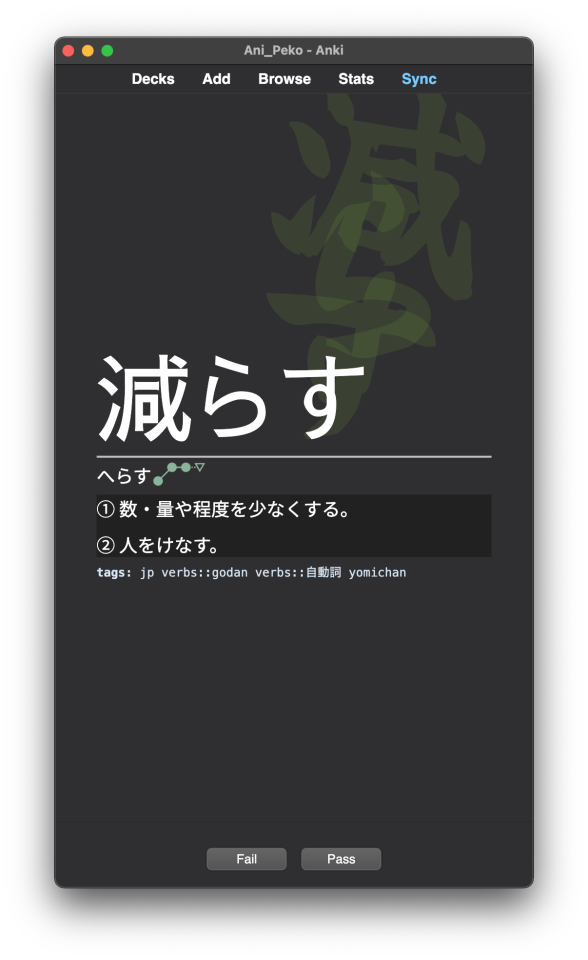
減らす 〖 へらす・herasu 〗
from dictionary.goo.ne.jp; my own translation.
1) 数・量や程度を少なくする・suu/ryou ya teido wo s'kunak' suru・to reduce the quantity, weight or degree of ~.
2) 人をけなす・h'to wo kenasu・to disparage, belittle or dismiss someone... to reduce them.
compare with the english definition from takoboto.jp:
to abate, to decrease, to diminish, to shorten.
*sighs heavily*
i took one look at the most common meaning in goo's dictionary and understood instantly what kind of reduction was meant, just from the kanji:
数・number, quantity;
量・weight, mass (this one can also mean 'quantity', but i have already seen it in so many words related to weight);
程度・degree, grade, standard;
少・little, few.
moral of the story: once you've absorbed enough kanji to make sense of japanese-language dictionaries? use those for a clearer sense of word meanings. thank you for coming to my TED talk.
note: i first saw this kanji in reigen's line to hanako in chapter 1 / season 1, episode 1. with other kanji, it's read げん (gen):
『…本気のCコースだと霊を99%削減することをお約束します。』
...honki no shii kousu da to rei wo kyuu-juu-kyuu paasento sakugen suru koto wo oyak'sok' shimas'.
...and the all-out course C, which guarantees a 99% reduction in spirits.
#mob psycho 100#mp100 manga#mp100#langblr#studyblr#japanese language#japanese#日本語#japanese langblr#language learning#語彙#kanji#tfw JP-EN dictionaries are less than helpful for word definitions#use monolingual dictionaries as soon as you can#anki study#flashcards
26 notes
·
View notes
Text
If there's one thing I've learned from translation is that online dictionaries are often useless if not unreliable
I just had to Google tanbark, and this was the umpteenth time an image search helped me out more than any dictionary
#translation#monolingual dictionaries are one thing#but with nouns im trying to stick to bilingual dictionaries to no avail lol
0 notes
Text
Wow, I had a brain fart. I typed 右手, and then tried to type 左手 by typing ひぎて and wondered why it wouldn’t come up asdfghjkl
#右手 (right hand) is みぎて and 左手 (left hand) is ひだりて#i was trying to copy down a definition and example from a monolingual dictionary into the jp>eng dictionary app i use#ebw.op
0 notes
Text
Monolingual dictionary online

#Monolingual dictionary online free
They also offer a thesaurus, a medical dictionary, a sports dictionary and a geographical dictionary. is an American publisher that mainly publishes dictionaries. Therefore, every aspect of an entry was handled by a different editor using different formulas or templates They include clear explanations on the grammar, with examples of how it is used in written and spoken English.Ĭollins Dictionary was the first British English dictionary made from the information output by a computer database. monolingual / ( mnlwl) / adjective knowing or expressed in only one language noun a monolingual person Compare bilingual, multilingual Collins English Dictionary - Complete & Unabridged 2012 Digital Edition William Collins Sons & Co.
#Monolingual dictionary online free
Look up the meanings of words, abbreviations, phrases, and idioms in our free English Dictionary. He Ptaka Kupu is a monolingual Mori language dictionary. The largest and most trusted free online dictionary for learners of British and American English with definitions, pictures, example sentences, synonyms, antonyms, word origins, audio pronunciation, and more. It collects all known uses and forms of each word in all variants of the language.Ĭambridge University Press has been publishing dictionaries for English learners since 1995. Search the Mori dictionary with the online version of Te Aka Mori-English, English-Mori. The Oxford dictionary, published by Oxford University Press, is considered the most comprehensive in the English language.

0 notes
Text
Italian monolingual dictionary online

#Italian monolingual dictionary online code
Goran Igaly – author of the initial English-Croatian database.Let me take this chance to thank all who contributed to the making of these dictionaries and improving the site's quality: To contact me for any reason please send me an email to tkuzmic at gmail dot com. I am responsible for the concept, design, programming and development. My name is Tomislav Kuzmic, I live in Croatia and this site is my personal project. Why not add a EUdict search form to your web site? Form Credits Disable spellchecking in Firefox by going to Tools → Options → Advanced → Check my spelling as I type. If you are searching for a word in the Chinese dictionary and not receiving any results, try without Pinyin (term in brackets). If you are searching for a word in Japanese (Kanji) dictionary and not receiving any results, try without Kana (term in brackets). Sometimes you can find translation results directly from Google by typing: eudict word. Although EUdict can't translate complete sentences, it can translate several words at once if you separate them with spaces or commas. Instead of clicking the Search button, just press Enter. If you are unable to add a bookmarklet in Mozilla Firefox according to the instructions above, there is another way right click on a link and select Bookmark this link… Now you can drag this link from Bookmarks to the Bookmarks Toolbar. If you want to type a character which isn't on your keyboard, simply pick it from a list of special characters.
#Italian monolingual dictionary online code
A bookmarklet is a small JavaScript code stored as a bookmark in your browser. There is a way to enable word translation from any page: Bookmarklets. Afterwards, you simply type the chosen keyword in the address bar to start the search in the chosen dictionary. In Chrome, first click on a language pair and change the search keyword in the field 'Keyword' to a keyword (eg: 'eudict'). And you're ready to go select EUdict from the drop-down list in search field (Firefox) or address bar (IE), input a word and press Enter. To add EUdict alongside Google, Yahoo!, Amazon and other search engines in Mozilla Firefox or Internet Explorer, simply click on link after the title Browser integration, select appropriate language pair and confirm your decision. Perhaps the best way to enable dictionary search is through integration into the search field of your browser. For the same reason the Chinese dictionary contains traditional and simplified Chinese terms on one side and Pinyin and English terms on the other. There are two Japanese-English (and Japanese-French) dictionaries and one contains Kanji and Kana (Kana in English and French pair due to improved searching). Look at the complete list of languages: Available language pairs The most common way is by word input (you must know which language the word is in) but you can also use your browser's search box and bookmarklets (or favelets). There are several ways to use this dictionary. Total number of translations (in millions): 14.6 Please help us improve this site by translating its interface.

0 notes
Text
Monolingual dictionary online

Monolingual dictionary online software#
the use of digital media: MLDs were among the first dictionaries to appear on CD-ROM, with the Longman Interactive English Dictionary leading the way in 1993.
Monolingual dictionary online software#
detailed information about collocation, such as the ‘collocation boxes’ in the Macmillan English Dictionary for Advanced Learners, which give lists of high-frequency collocates, identified using ‘Word Sketch’ software.the use of intelligent software for extracting information from corpora and for automating the dictionary-making process.the use of corpora as a basis for language description, a radical innovation which was introduced by the COBUILD project in the 1980s and is now standard practice in lexicography.Since the 1980s, the English MLD has, arguably, been the most innovative area in the field of lexicography, in terms of both the way dictionaries are written and the aspects of language which dictionaries describe. Monolingual learner's dictionaries have been the subject of a great deal of scholarly work, and the standard book on the subject is Cowie 1999. Merriam-Webster Advanced Learner's English Dictionary, 2008Īll of these dictionaries are available in hard copy and online.Macmillan English Dictionary for Advanced Learners, 2002.Cambridge International Dictionary of English, 1995, now published as the Cambridge Advanced Learner's Dictionary.Collins Cobuild English Dictionary, first published in 1987.In addition to the Oxford and Longman dictionaries, these are: There are currently six major MLDs for advanced learners. The Longman Dictionary of Contemporary English was published in 1978, and its most striking feature was the use of a restricted defining vocabulary, which is now a standard feature of learners' dictionaries. Other publishers gradually entered the market. It was subsequently republished as A Learner's Dictionary of Current English in 1948, before acquiring its current name. It was originally published in Japan in 1942 as The Idiomatic and Syntactic Dictionary of English, written by A. Probably the best-known English monolingual dictionary for advanced learners is the Oxford Advanced Learner's Dictionary. Since the end of World War Two, the MLD has been a publishing phenomenon, with global sales running into tens of millions of copies, reflecting the boom in the English language teaching industry. The first English MLD, published in 1935, was the New Method English Dictionary by Michael West and James Endicott, a small dictionary using a restricted defining vocabulary of just 1490 words. But most of the activity in this field is in the area of dictionaries for people learning English. Monolingual learner's dictionaries have been produced for learners of several languages, including German, Spanish, Dutch, and Chinese. And while the definitions in standard dictionaries are often written in difficult language, those in a monolingual learner’s dictionary aim to be simple and accessible. Dictionaries for learners include a great deal of information on grammar, usage, common errors, collocation, and pragmatics, which is largely missing from standard dictionaries because native speakers tend to know these aspects of language intuitively. MLDs are based on the premise that language-learners should progress from a bilingual dictionary to a monolingual one as they become more proficient in their target language, but that general-purpose dictionaries (aimed at native speakers) are inappropriate for their needs. A Monolingual learner's dictionary (or MLD) is a type of dictionary designed to meet the reference needs of people learning a foreign language.

0 notes
Text
all my mandarin dictionaries (and dictionary-adjacent books)
Through chatting with @don-dake and @cherrymintvampyyri, I've come to realize that I might own a less than normal number of Mandarin dictionaries. So, here's a post about all of them.
I do have two basic bilingual dictionaries (Mandarin/English): the Langenscheidt pocket dictionary and the DK visual dictionary. These are quite easy to buy and not that interesting imo, so I'm not gonna talk further about them.
I'm also going to include a couple books that aren't technically dictionaries, but are rather about etymology of characters, and that's close enough to count for me.
Okay, let's get on to the interesting stuff!
1. What Character is That? An Easy-Access Dictionary of 5,000 Chinese Characters by Ping-gam Go (second edition, 1995)
bilingual
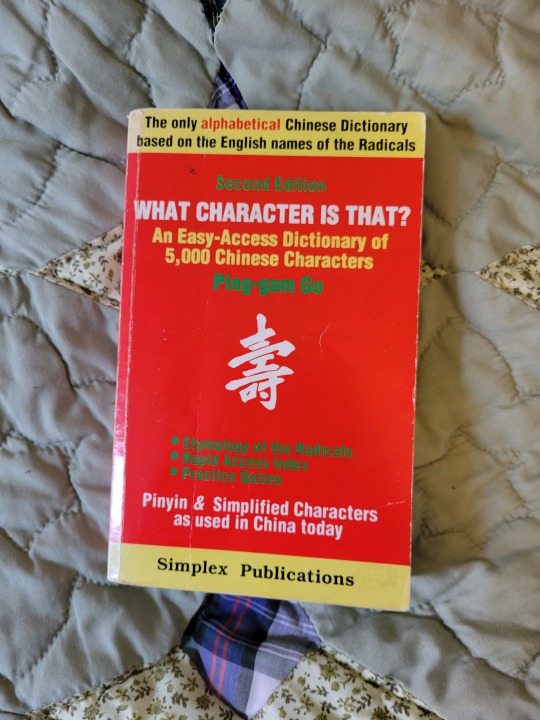
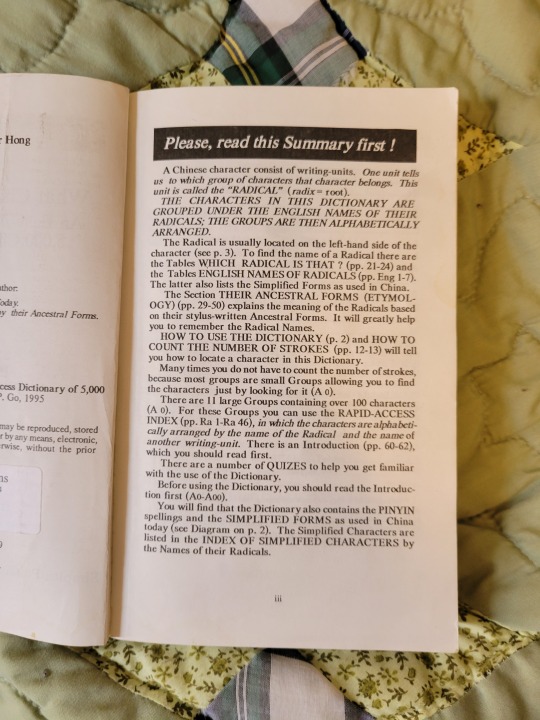
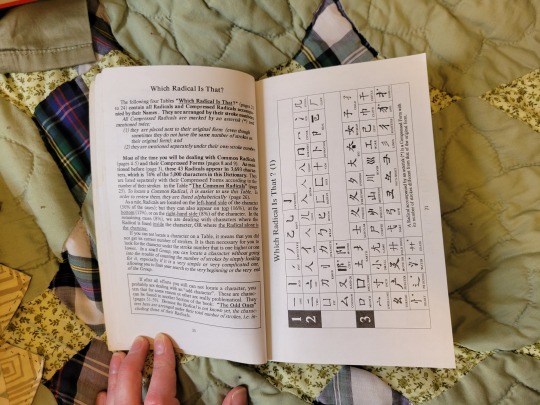
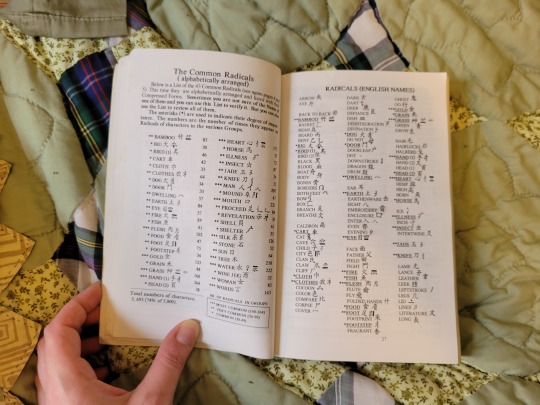
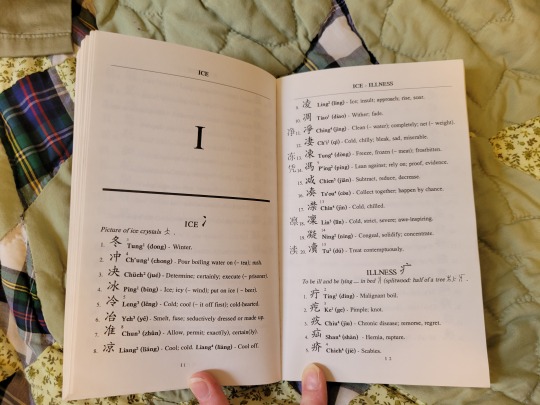
This strange little dictionary was gifted to me by a nun who went to high school with my grandma and later lived in China as a missionary. It's organized alphabetically based on the English translation of each radical?
I have not used this dictionary for actual reference ever, because I flipped through it once and realized that it was absolutely whack. But it's cool to have I guess.
2. 新华字典 第11版
monolingual
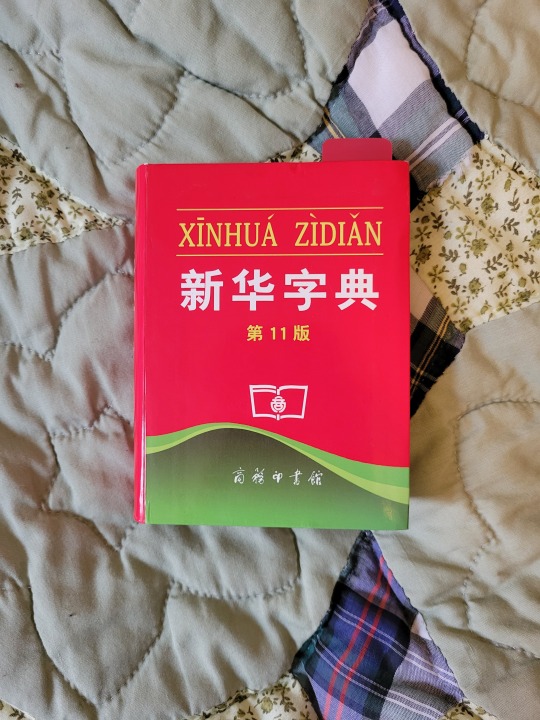
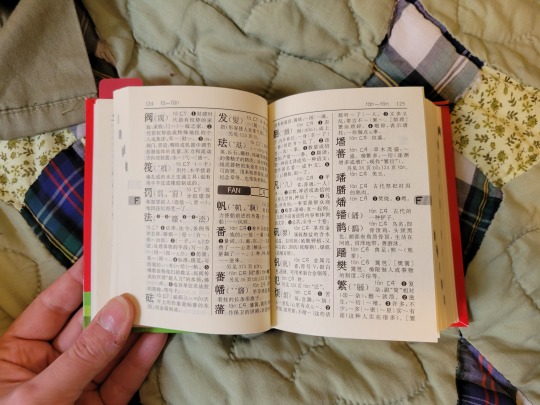
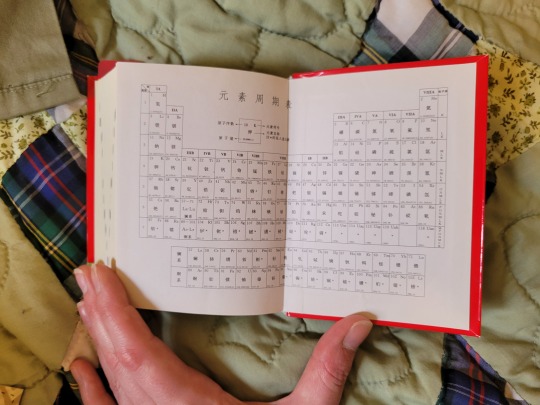
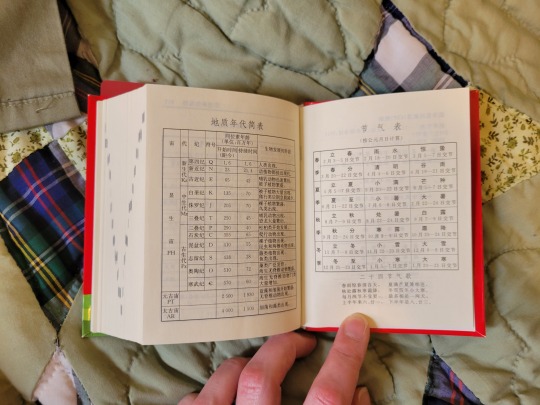
This little guy was gifted to me by a Chinese classmate back when I was in college. It's a 字典, so it's just focused on defining individual characters and providing some words featuring that character. Despite being a mainland dictionary, it also has 注音 next to each character for some reason.
It's got some neat stuff towards the back, like the periodic table and a chart of all the 節氣 solar terms.
3. 小学生全笔顺 同义词 近义词 反义词 组词 造句 成语 多音多义字 词典
monolingual
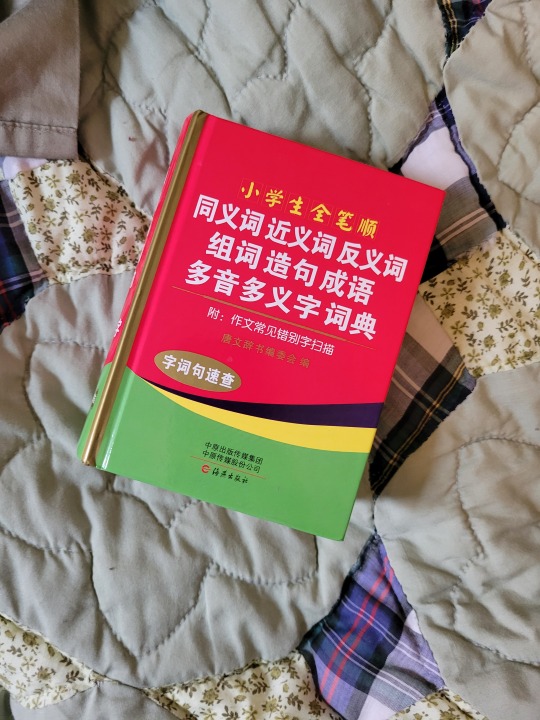
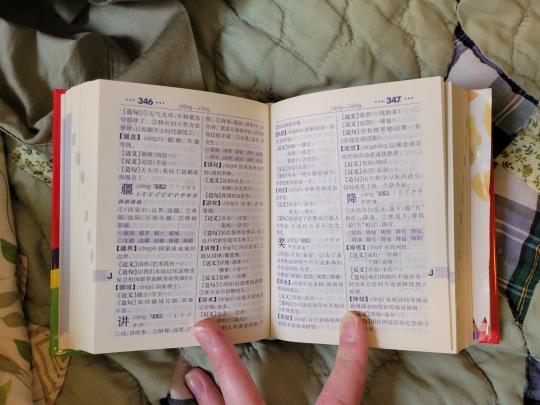
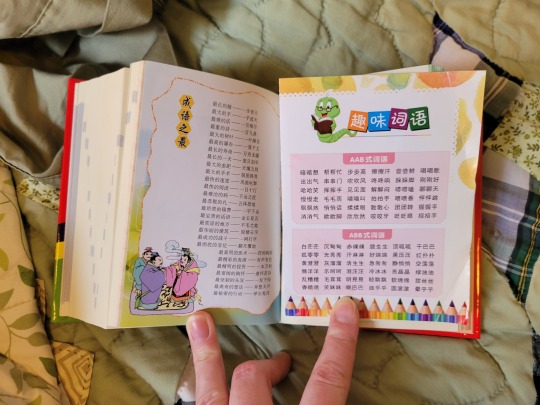
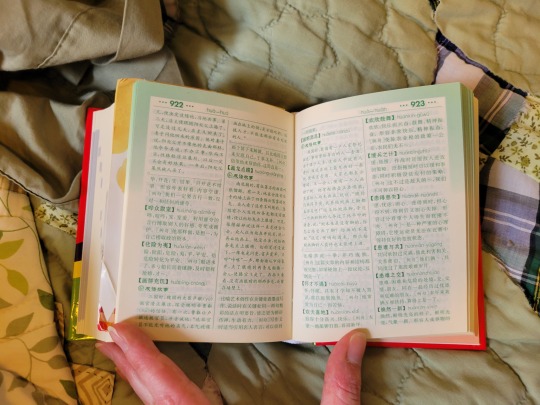
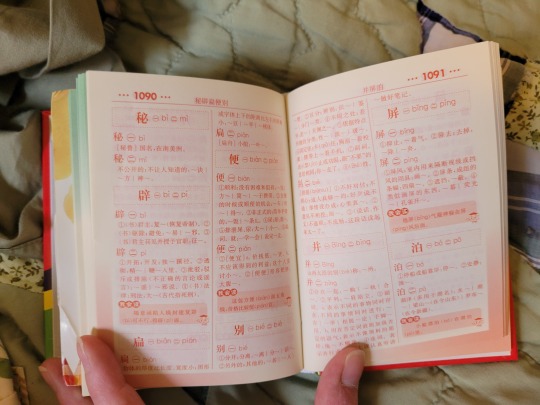
Whew, that's a mouthful. This is an actual 词典, so it defines full words. It also provides example sentences, synonyms, antonyms, and close equivalents. Then there's a section for idioms, and another section for 多音多义字.
There's also this nifty little insert with examples of words/phrases that follow common patterns of repetition.
4. 新现代汉语词典
monolingual
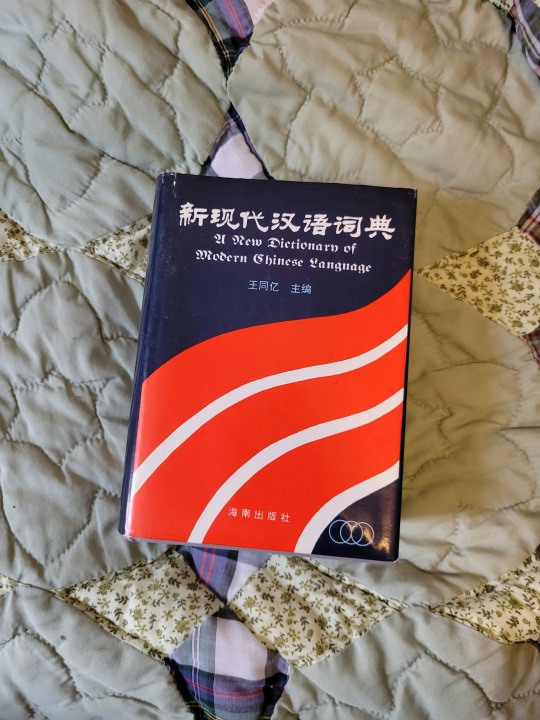
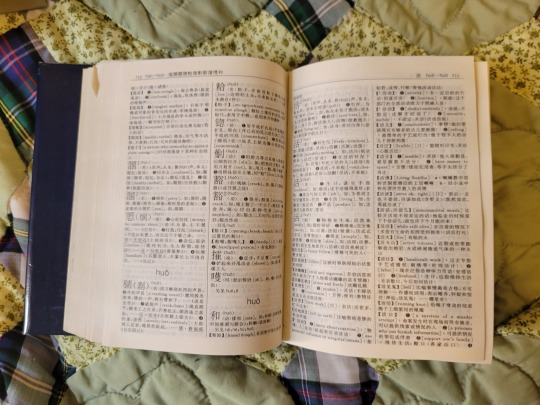
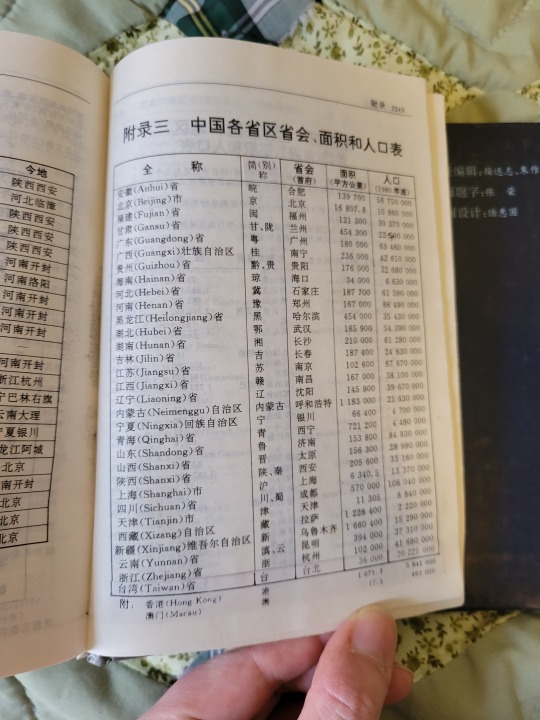
I picked up this chunky guy from a used bookstore down the street from me (the owner of the store passed last year, and the store is no longer there unfortunately). This is a fairly normal dictionary, it's just bigger than my others and has more words listed in it.
One thing I also noticed is that this chart towards the end of the dictionary apparently had a strip of paper pasted on the bottom. It doesn't seem like something I can peel up without damaging the paper under it, and when I shine a flashlight through the page I can't make out any major differences between what's on the sticker and what might be on the page under it. So my best guess is there might have been some damage to the text on the page?
5. 商务馆学汉语近义词词典 The Commercial Press Guide to Chinese Synonyms
monolingual
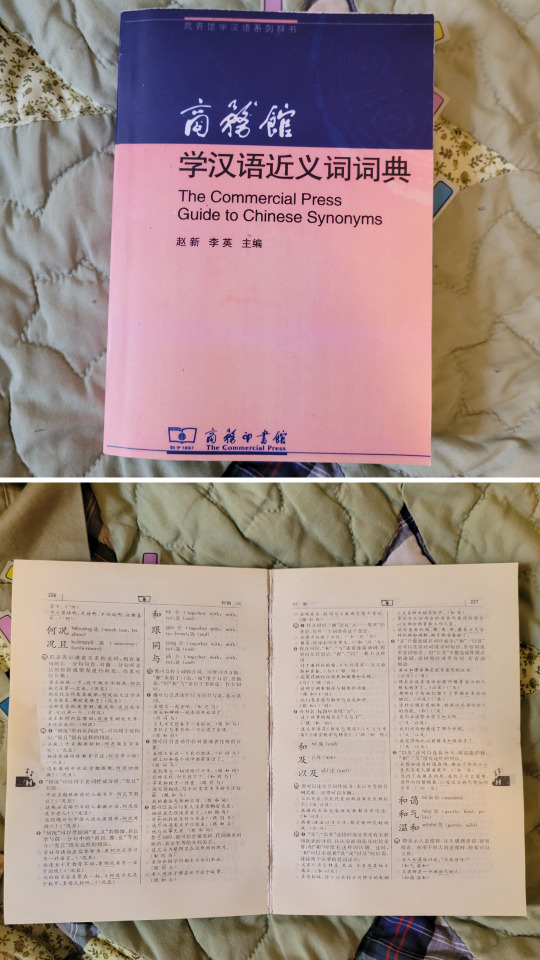
This book is easily the one I reference the most. As the name suggests, the book is all about synonyms. It takes sets of 2+ similar words and thoroughly explains the similarities and differences between them all. There's plenty example sentences, with notes about whether the synonyms can be used interchangeably in certain contexts.
It's a great resource, but I had a bit of trouble getting my hands on a copy. It's possible that in the years since I bought it there have been more copies made available for sale though.
these next two are books I haven't explored too much since they are old and the binding is incredibly fragile and starting to fall apart. just opening them is stressful.
6. 漢字分解 Chinese Characters Explained by F.X. Keelan (aka 康愛玲修女) (1967?)
bilingual
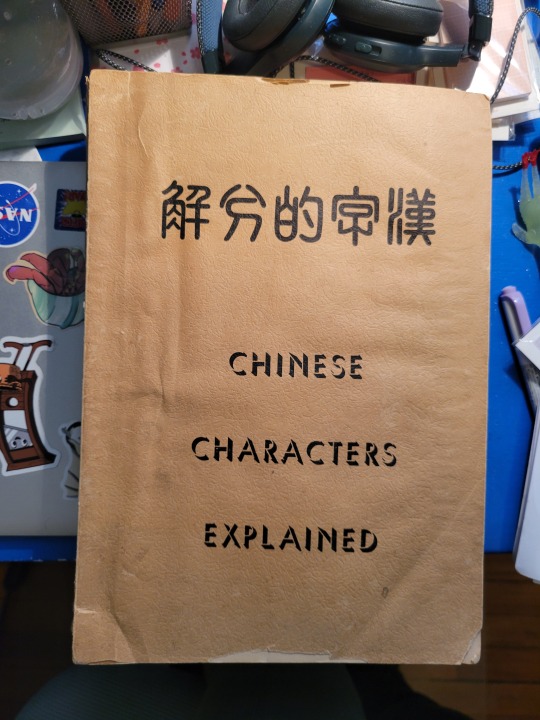

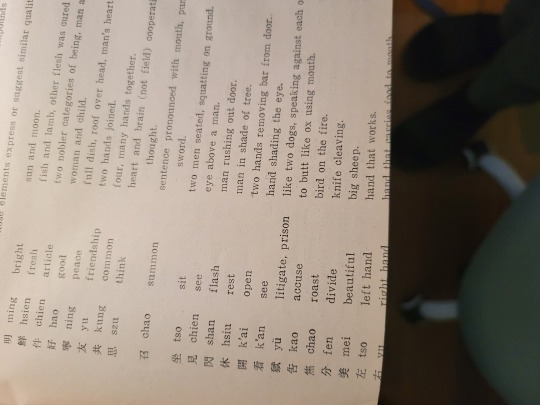
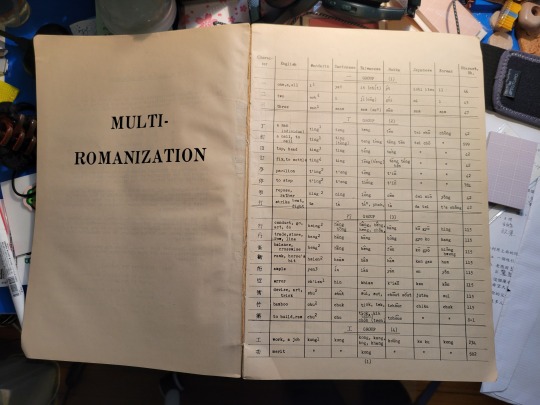
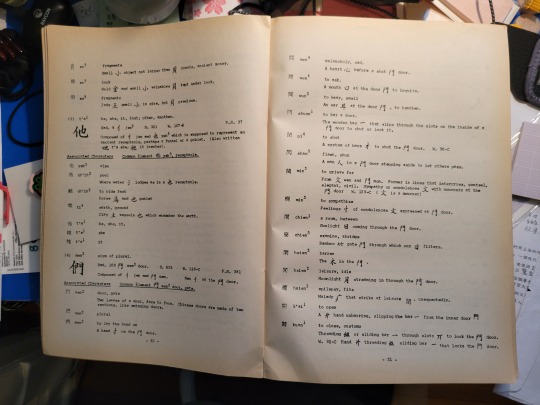
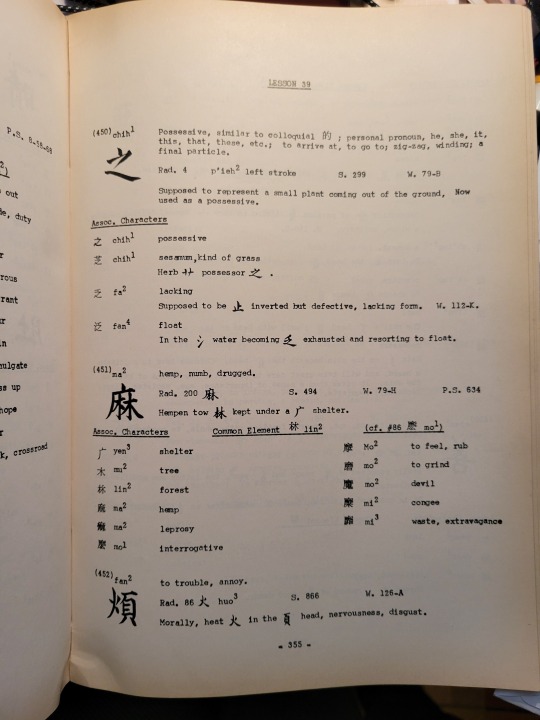
This book was also gifted to me by the nun who went to school with my grandma, and appears to also have been written by a nun! Based on what I've found from Google, this book was published in 1967.
Rather than a dictionary, this book is "a compilation intended as an aid in grouping and remembering [Chinese characters] with a view in acquiring a reading knowledge of Chinese"(p. iii). It aims to break down characters into radicals and giving similar/related characters. It's apparently the final installment in a 4 part Mandarin Course.
This book uses traditional characters. According to Google Books, the publisher is 光啓出版社, which is a Taiwanese organization. The book includes a very long table that has Mandarin, Cantonese, Taiwanese, Hakka, Japanese, and Korean pronunciations for (what seems to be) every character mentioned in the book. The intro mentions that this is so the course is more "accessible" for speakers of other East Asian languages.
Also, look at that printing error in the third photo! The text got cut off at the bottom of the page.
7. The Structure of Chinese Characters by John Chalmers (second edition, 1911)
bilingual
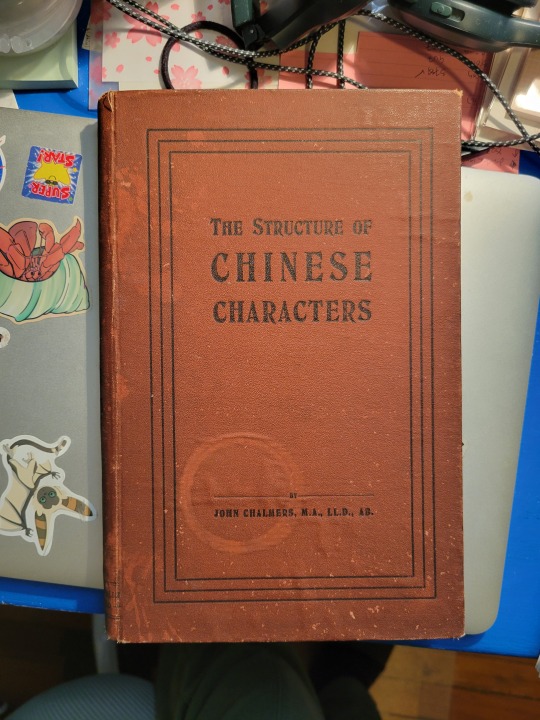
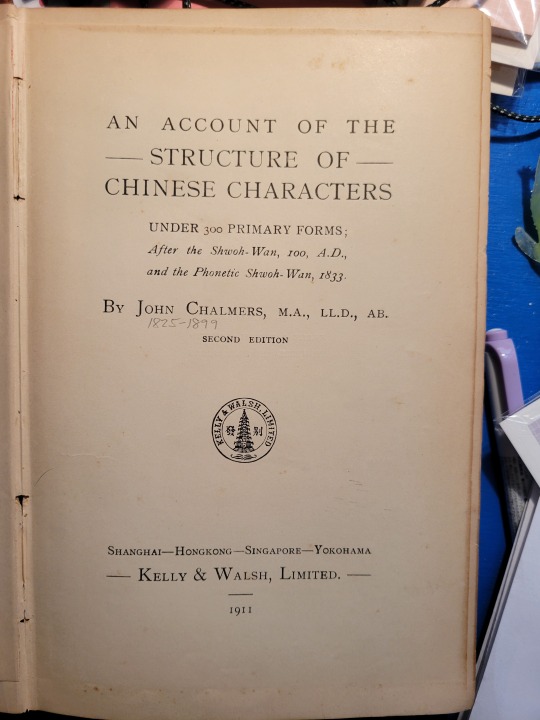
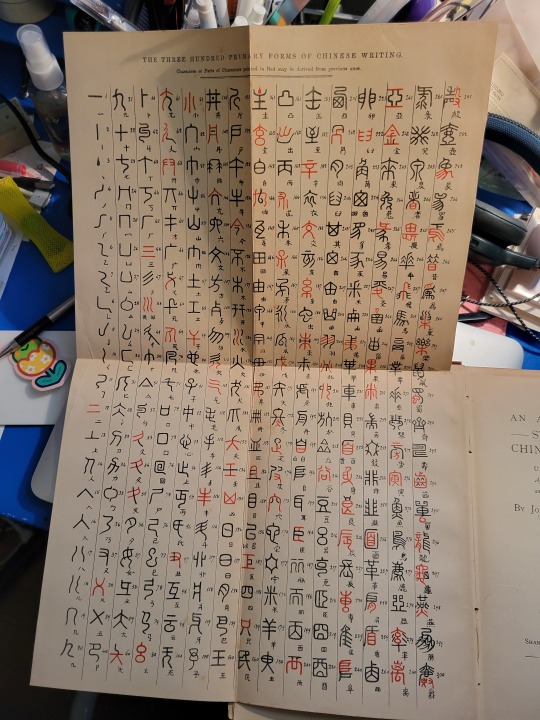
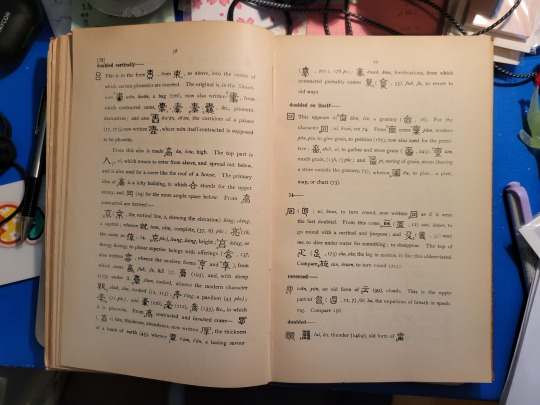
This final book is the oldest of the bunch, and was gifted to me by my boss's boss for some reason? She found it in a used bookstore apparently.
This book also uses traditional characters, because simplified characters just weren't a thing yet in 1911. This book is falling apart, and opening it stresses me out. It creaks whenever I open it.
Going by the title page, the full title of this book is An Account of the Structure of Chinese Characters Under 300 Primary Forms; After the Shwo-Wan, 100 A.D., and the Phonetic Shwoh-Wan, 1833. It was published by Kelly & Walsh, which was a Shanghai-based publisher.
Someone very kindly penciled in the years the author was alive: 1825-1899. John Chalmers was apparently a Scottish missionary (bc of course he was) who apparently popularized the term "Cantonese". This book that I own in particular was originally published in 1882.
It is, as the very long title suggests, an analysis and etymology of 300 common components
It also has a nifty fold-out of all 300 "primary forms" in seal script.
68 notes
·
View notes
Text
so anki is the love of my life, and i'd like to discuss it re language learning.
spaced repetition systems in general
SRSs are helpful tools to prevent memory loss for specific facts. there's some criticism behind the specifics, but it's pretty safe to say that it's good to have a huge flashcard deck with relevant flashcards where you review the new-to-you stuff with relative immediacy and your already-reviewed stuff with relative distance.
flashcard model recommendations
go for a monolingual deck!!! if you absolutely can't, edit the flashcard to monolingual after you're vaguely familiar with the word!!! (i use wordreference - it's good but imperfect)
edited to add - a TL/NL vocab deck can be very efficient if languages are from the same family
i use a picture for the front unless the vocab word is too high concept, and using a picture would just be misleading/ineffectual.
i use soundclips about half the time - i pull clips from wiktionary, forvo, & the collins dictionary.
i use the fill-in-the-blank feature (cloze) pretty heavily with antonyms, and if i'm trying to remember specific usages of common words/phrases
i also use the fill-in-the-blank feature for chunking, altho i use this fairly rarely
i recommend 25 new words daily, or anything that'll set you for your regular pomodoro time for studying vocab (which is 25 mins for me).
i'm not at an advanced level yet for language learning, but this format is recommended for higher levels!
i lowkey recommend including example sentences on the backside, re chunking, but the utility really can depend on the vocab word
limitations
some limitations are a bit obvious - the quality of your study is 100% down to the quality of the flashcard (e.g. accuracy, relevancy, does it need more explanation for you to understand it)
it's also a hell of a time-suck to create these decks. i study 25 new cards a day, which means i have to create about two hundred flashcards every week. i make this quicker by having an ongoing list of words to add to my deck, instead of trying to look up vocab lists or whatever in the moment. i also do the whole week at once because i do get into the rhythm of dictionary-picture-audio searching while watching tv or whatever.
there are some fun add-ons (like for deadlines), and some complicated customization within anki itself. i usually just google if i have a question - a ton of people use anki, so there are tutorials for almost anything you want to do.
fluent forever
if you're unfamiliar, the fluent forever guy wrote a book about language learning which really hinges on a specific model of flashcard. he has tons of tutorial videos on his website, but basically he incorporates the phonetic alphabet, Google Images, and other relevant info for a vocab word (and grammar) in a flash card.
i think his flashcards take an unrealistic/unproductive amount of time, with a bunch of useless filler. however, i do recommend doing a quick read-through of his model and reasoning, as he might speak to something that you're struggling with. (for example, i've never struggled significantly with pronunciation so i think the IPA stuff is 100% useless.)
here's an integration to create the fluent forever flashcards much much faster. i don't use it but i've seen it recommended before.
outside of language learning!
i've used anki to learn for my work certification, for english vocab words from books i'm reading, and for titles of paintings that i want to remember forever. i wouldn't recommend shared decks for language learning, but i emphatically recommend them for other subjects!
210 notes
·
View notes
Text
Level 1 of learning a language is thinking that every word in your language has a direct translation to your target language, and if a word has two meanings in one language it’ll have the same two meanings in another language. (“忙しい means busy, so that means I can say that the park was 忙しい, right?”)
Level 2 of learning a language is realising that that’s actually supremely unlikely, statistically speaking, which means you need to start using a monolingual dictionary to understand meaning without your native tongue getting in the way.
Level 3 is realising that there are actually shitloads of cases of level 1 actually being true…
とる means to take (an object), but also take (a photo)
鋭い means sharp (knife), but also sharp (mind) and honed (sense of smell)
受け入れる means to accept (physically, e.g. a gift) and also accept (mentally, come to terms with)
取り上げる means to pick up (physically), pick up (a news story), AND take up (e.g. a new hobby)
370 notes
·
View notes
Text
the teruki hanazawa arc seized me by the brain almost two years ago and still refuses to let go. teru is just warped in a slow-burn-horror kind of way, despite his apparent good cheer, and i find him tragically fascinating.
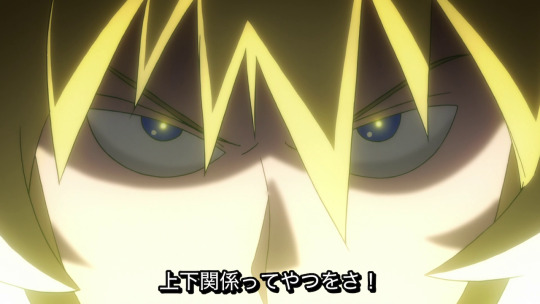
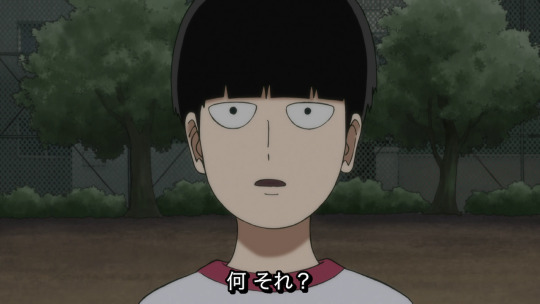
i looked up a word he attempts to bludgeon intimidate shigeo with in episode 5: 上下関係。
it's read じょうげかんけい (jougekankei).
for context, here's teru's dialogue where it appears:
「聞きたいことは いくつかあるけどその前にハッキリさせとかないとね。上下関係ってやつを差!」
ききたい こと は いくつ か ある けど その まえ に はっきり させ と かない と ね。じょうげかんけい って やつ を さ!
k'kitai koto wa ik'tsu ka aru kedo sono mae ni hakkiri sase to kanai to ne. jougekankei tte yatsu wo sa!
'i have some questions i want to ask you, but first i have to clarify something. between the two of us, who answers to whom?'
the english subs translate 上下関係 as 'hierarchy', though it's a little closer maybe to 'pecking order' or 'senpai/kouhai dynamics'. i couldn't even find it on a 15000-word japanese frequency list. fortunately, this 四字熟語 (よじじゅくご・yojijukugo・four-character idiom)'s individual components are common and easily assimilated; i was able to understand what it meant on sight:
上下 = among other meanings, high and low, top and bottom... the ruling and the ruled.
kanji: 'up, above' + 'below, down, inferior'.
関係 = relationship, connection, concern.
kanji: 'gateway, connection' + 'thread'
the katakanized english loanword for hierarchy, ハイアラーキー, is far more common in japanese. so why would teru use this word? why might he just drop it on shigeo without explanation as he does?
much of the vernacular co-opted by criminal organizations -- at least in anime -- tends towards the archaic and/or formal, in keeping with samurai ideals they profess to uphold. was this language he picked up from fending off claw mooks, alone, throughout his childhood?
knowing the exact word teru uses for 'hierarchy' lends even more hilarity in japanese to shigeo's bafflement when he hears it. it's unlikely that he would know teru's peculiar choice of expression, given his lack of interest in academics. the joke in the english translation falls a little flat IMHO, as the boy doesn't seem so poor a student as to be unfamiliar with the word 'hierarchy' or the concept.
i... i want to examine more of teru's language now in this arc, to see how much of it is as elevated as this word and his sense of self-importance here.
an edit (2023.03.31) for some minor errors in this post:
上下関係 actually isn't a yojijukugo... not all four-character expressions are four-character idioms, of course. i should have consulted the monolingual japanese dictionaries i use on this. ごめんなさい!
my transliteration of the line 「聞きたいことは いくつかあるけどその前にハッキリさせとかないとね。」 should have been:
k'kitai koto wa ik'tsu ka aru kedo sono mae ni hakkiri sasetokanai to ne.
i still get stumped semi-regularly by 〜て+おくcontractions in the wild. thank you @listlessnss for this and the previous erratum!
させとかない is just させる (to cause or make someone do. usually taught to JSL learners as an inflection of する) in its conjunctive affirmative form させて + 置く (as an auxiliary verb, here meaning to do a thing in preparation for something else).
'formal' would have been a better word choice than 'archaic' for describing 上下関係。上下関係 is not an archaic word, but it is uncommon-ish and more likely to be found in formal writings.
#langblr#mob psycho 100#mp100#mp100 meta#mp100 s1 rewatch#image described#image description in alt#japanese language#japanese#日本語#語彙#japanese langblr#language learning#kanji#usage notes#word usage#mp100 s1e5#200#hanazawa teruki#分析
213 notes
·
View notes
Text
Okay wanna talk about this bit:
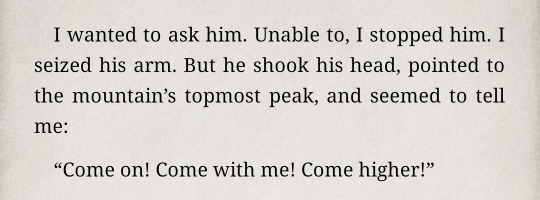
Specifically about the words Aronnax imagines Nemo addressing to him.
Here's the French:

So, literally translated, Aronnax is imagining Nemo saying "Come! come still! come always!" ("toujours" can also mean "still", I think this is another case of double-entendre). This struck me as Aronnax sort of fantasizing about the romantic notion of, like, "I will always follow you."
It's also, afaik, the only time either of them uses (or imagines the other using) the "tu" form (the "vous" form here would have been "venez" instead of "viens"). Let me explain real quick.
So, I'm taking this from a 19th century monolingual French dictionary by Émile Littré because I'm a pedant and a nerd:
"La seconde personne a deux pronoms pour le singulier, tu et vous. Tu s'emploie dans la familiarité entre camarades, amis, parents, mari et femme, etc."
In English:
"The second person [you] has two pronouns for the singular, tu and vous. Tu is used in the familiarity between comrades, friends, relatives, husband and wife, etc."
He doesn't similarly define "vous" but basically, it's more formal.
Anyway, the rest of the book, in Actual Real Speech, Nemo and Aronnax use "vous" for each other--which makes sense! In fact they are very formal in their speech in other ways, too, even after Aronnax has been there for a while. And in the Real World where they are simply two scientists who Respect Each Other Very Much, this is perfectly appropriate!
But when he imagines Nemo speaking to him, beckoning him to follow, Aronnax imagines him using the more familiar "tu."
I'll close with one more quote from that dictionary:
"M. de Bussy demande si l'on doit se tutoyer en amour ; et, après avoir dit que cela est indifférent, il finit par ces vers : Le vous me paraît plus galant ; Mais je trouve le toi plus tendre."
which is
"M. de Bussy asks if we should use tu in love; and, after having said that it makes no difference, he finishes with these lines: Vous to me seems more gallant; But I find [tu] more tender."
72 notes
·
View notes
Text
Treasure of the Castilian or Spanish Language
My good friend gave me this very small book that was a translation of some of the many thousands of entries from a Spanish dictionary written at the turn of the 17th century. The original was by Sebastián de Covarrubias Horozco, and the dictionary was described, at the time, as "a large work of…slovenly erudition". The translator included only a few entries (the book is 62 pages long), but, let me tell you... You're in for a treat.
Here are some entries from a monolingual Spanish dictionary from 1617:
AJO (GARLIC)
Garlic is so well-known that one need not describe it. Garlic is not a food for courtly people. The leopard abhors the smell of it; if the leopard's lair is scoured with garlic, the leopard forsakes it. Garlic rubbed against the trunk of a tree keeps caterpillars away.
ANDRÓGENO (HERMAPHRODICTIC)
Some say that women have three wombs on the right side and three on the left and one in the middle; some wombs create males, the others females, and the one in the middle hermaphrodites. And others attribute even more wombs to women, and many allow for none of this.
APIO (CELERY)
The symbol of sadness and weeping.
BERENJENA (EGGPLANT)
Eggplants are not beautiful. They taste insipid; they sadden the spirit; they cause headaches; their bad quality comes out in the face of he who eats too many, giving it their livid or dark green color.
C
It is a silent letter. It was called the sad letter.
COCODRILO (CROCODILE)
The crocodile follows the man who flees it, and it flees the man who follows it. It flees from saffron. The crocodile that follows the one who flees it and flees the one who follows it is a symbol of glory and honor. A crocodile surrounded by wasps need not be feared.
DIAMANTE (DIAMOND)
The diamond can be worked with no instrument except another diamond and the hot blood of a goat.
DRAGÓN (DRAGON)
For a serpent to become a dragon, it first had to eat many other serpents.
FADAS (FAIRIES)
Enchanted nymphs or women who pretend they cannot die.
GALLO (ROOSTER)
The rooster has a hidden virtue: when placed in the presence of the lion, it makes the lion run. The rooster always faces its beak to the wind—this keeps its tail feathers composed. Roosters grow livelier with garlic paste.
GIRASOL O TORNASOL (SUNFLOWER)
Salute this plant.
H
Its figure is formed of the light and the strong.
HIEDRA (IVY)
The copyist making a clean copy of my papers left this word between the lines, and many other words remained with it, forgotten, as I was so sick I couldn't write with my own hand or look over what was written in another.
HORMIGA (ANT)
Some ants grow wings to lose themselves.
JIRA (PICNIC)
To a certain friend it seemed that the word "picnic" may have come from the Greek word for "pig," because the day the pig is killed is a day of joy, and because of the many good morsels that the pig provides, and furthermore the whole house rejoices, even the children, who play ball with its bladder. The pig is the rich man who has poor debtors and grunts like a pig his whole life until he dies.
LAMER (LICK)
Sheep lick salt, dogs lick blood they find on the ground. To lick plates is proper to boys who delight in belly cheer.
LECHO (BED)
Delight in leisure grew, and men invented sleeping on the delicate feathers of the breasts of swans and other birds and on mattresses of cotton and wool, and even with all this the delicate can sleep no more than if they threw themselves on brambles and thistles because of the cares and passions pricking their souls.
LEÓN (LION)
The lion isn't as brave as they say. For the Egyptians it symbolized the heart, the sun, the earth, or he who subjugates others' hearts. It suffers from mosquitoes that bite its eyes; it flees from the sight of the rooster and the rooster's voice, particularly if the rooster is white. Why this is so is unknown. Nature provided that this most ferocious of animal be less prolific than the rest, in contrast with the fecundity of the fearful little rabbit. The lion cub ravages its mother's womb with its claws. The lion forgives.
MIEL (HONEY)
Common honey is nothing but dew that falls over the leaves of grass and trees that bees deflower and lick with great appetite, swelling in size until they are forced to vomit.
OSO (BEAR)
It is unwise for brave men who hunt these wild beats to wait and fight them face-to-face, since bears tend to be dangerous.
PULGA (FLEA)
This insect is made from dust and a little dampness.
Q
"Q" is mute, because it sounds like "c" and in a certain lazy way, like "k."
SANGRE (BLOOD)
Blood of the dragon: the true blood of the dragon is the blood that runs from the dragon that has fought with the elephant, which, atop the dragon, crushes it. The dragon tries to cling to the elephant's belly as there the elephant's hide is thin, and the blood that the dragon sucks out mixes with its own and becomes the true blood of the dragon.
SIETE (SEVEN)
There are books written only on this topic.
TÚ (YOU)
A primitive pronoun of the second person.
UFANO (SMUG)
Soaked in joy like the breadcrumb in liquid that loosens and puffs.
VIDRIO (GLASS)
That which pleases us most about glass is its transparence. If glass did not break, silver or gold couldn't compare with it. The Romans used glass clocks. The ancients drank from glass cups with great delight, as do those now for the joy the sight of glass gives us: if you fill it with water, it seems like a diamond, while red wine makes it like a ruby, and white wine, a balas burning with color, a quality that cups of myrrh, being like mirrored black stones, do not possess.
VIGÜELA (VIHUELA)
Very few have learned to play the vihuela since the invention of guitars. This has been a great loss, as the guitar is no more than a cowbell, an instrument so easily played, especially if strummed, that every stable boy plays it.
X
The drunk becomes an "x" because his weak legs cross. A very erudite man censors this letter.
YESO (GYPSUM)
A stone that glints like crystal. A poison. I do not understand how some young women peel the crust off the walls and eat it like icing.
ZUCIO (DIRTY)
Sweat keeps man from being lustrous.
***
This is but a selection. I've omitted the shortened definition of elephant, which was originally twelve pages long (this guy evidently revered elephants—and roosters. And goats. I omitted that one, too, as it was long). The translator is Janet Hendrickson, and you can find this book at ndbooks.com. It's an absolute treasure.
78 notes
·
View notes
Note
Hej! Hur mår du? I'm trying to learn swedish for my partner, would you happen to have any tips? Babbel is very useful, but I loved your blog so much I scrolled all the way to the bottom last night so I wanted to ask you. Tack (so? Sa?) Tack sa mycke!
Hej, tack så jättemycket för dina snälla ord! :) I’m really glad if you liked my blog.
I’m not sure I can give much useful advice, but I’ll do my best to describe what worked for me. So, here’s how I’ve been teaching myself Swedish:
I used several grammar reference books at the same time, to get a fuller overview of the language + get to do as many exercises as possible haha. The ones I used were the Routledge essential grammar and comprehensive grammar (as well as one in my own native language but well, that probably won’t be useful to you…). They’re all available as pdfs online. I would pick a grammar topic, scan all my books and do an additional internet search if necessary to compile and condense the information in my notes, then do some exercises. Initially I tried to do one or more topics every day but then found it more productive to alternate “grammar days” with “vocabulary days”
Speaking of which, I approached vocab in a similar way in the beginning: pick a topic, like colours or numerals or body parts, make a list and cram it. For adjectives, I found it an efficient strategy to learn them in pairs of antonyms
I kept a diary in Swedish for some time, which was helpful because that way I learnt and used specific vocabulary relevant to me and my life
I started reading, watching and listening stuff in Swedish quite early on, which I highly recommend to get comfortable with the language. To translate new words, I tried to refer to a monolingual Swedish dictionary as much as possible. Note: I could post a list of particular podcasts/YouTube channels/news resources etc that I liked if you guys want me too! But obviously it largely boils down to what you’re interested in.
Related to the previous point, I follow both teachers of Swedish and Swedish natives on social media to increase immersion
Good old Duolingo was rather nice, especially early on, to get the basic vocab and some grammar down
Quizlet and thematic Tumblr vocab lists proved rather useful too, especially when I wasn’t too lazy to review them
+ Some cool resources I use for Swedish as well as other languages:
Omniglot (a great place to start with any language: basic info + resources)
Glosbe (Reverso context but make it better)
obviously, Wiktionary (useful to look up declensions)
Last but not least, I encourage my followers to add their tips too!
Jag hoppas att det hjälper dig :)
33 notes
·
View notes
Text
Full Norwegian-Resource Index
As many online norwegian learning resources I could find. Thanks to Reddit r/norsk for most of the links on this list. That being said, I have not used all of these sites, but as someone who is weary of online webpages and downloading malicious links, I can tell you that as far as I know, everything is safe to use!
SKAM - Norwegian teen show
LearnNoW - Online course
DinOrdbok - Online dictionary (Bilingual)
Dict - Online dictionary (Bilingual)
Naob - Online dictionary (Monolingual)
Duostories - Short stories from Duolingo
Barnebøker - Short stories for beginners
KlarTale - News site in straightforward Norwegian (beginner friendly)
NorskPrøven Example Tests - Tests of A1-B2 level
NTNU - Paper exams + answers
BliKlar - Short tests of A1-B2 level
Duolingo Forum - Grammar notes from Duolingo
Grammatikk - Free online grammar book
NyNorskBok - Online reading list
14 notes
·
View notes
Note
In your experience, how hard is to learn Na'vi?
It very much depends on the person. For myself...well, I wouldn't say it's easy per se--learning any new language is a challenge--but it's really not that bad. Compared to natural languages which are of course much more complex, Na'vi is fairly straightforward.
One advantage I have personally is having studied a bit of Japanese in the past. One thing that some monolingual folks don't always realize is that translating isn't as simple as taking a dictionary and substituting each word one by one--different languages have fundamentally different grammar structures.
Na'vi has a few grammar structures that are very foreign to English but familiar to Japanese. For example, limited free word order and marking parts of speech. English relies on word order to make who's doing what in a sentence. Hence, "I eat pizza" makes sense, but "pizza eat I" doesn't.
In both Japanese and Na'vi, however, there are grammatical bits that explicitly mark the role each noun plays in a sentence, and therefore frees up your word order. Japanese does this with particles while Na'vi does it with case endings.
Watashi wa piza o taberu
Oel pitsati yom
(Japanese it actually a little stricter with word order than Na'vi as the verb in Japanese is always expected to go at the end whereas in Na'vi it can go anywhere, but it's the same general idea.)
Similarly, Na'vi adpositions can behave similarly to some Japanese particles:
I walk to the forest
Watashi wa mori ni aruku
Oe na'rìngne tìran
Though again, Na'vi is a little more flexible in that the adposition can go before or after its relative noun ("ne na'rìng" and "na'rìngne" are equally acceptable).
Na'vi can also utilize a topic-comment structure; it doesn't do so nearly as often as Japanese does but it does exist and can be little weird for English-only speakers to wrap their heads around at first.
Of course, all that rambling aside Na'vi grammar as a whole is still very different from Japanese grammar as a whole and the two languages have plenty of stuff that set them apart--I just want to illustrate how studying Japanese in the past made it easier for me personally to grasp some of the less-Englishy aspects of Na'vi than it would've been otherwise.
And that's true of languages in general tbh; the more of them you learn the easier it becomes to pick up new ones.
That said, while having prior language experience is certainly helpful in learning Na'vi (or any language), don't let not having any stop you from giving it a go if you want! As I mentioned at the beginning, compared to natural languages it's really not so bad even without prior experience; we've got lots of learners who do well even if it's their first new language :)
#lì'fya lena'vi#hoohoohoooooo boy my japanese is rustyyyyyyy o_o;#was never anywhere close to fluent to begin with; just took some classes in college and that was a fair few years ago now#i am definitely more confident in na'vi than I ever was in japanese ^^;#but oh well w/e gets the point across i guess ¯\_(ツ)_/¯#sorry for the rambly ramble
63 notes
·
View notes
Note
https://www.tumblr.com/blog/view/therealvinelle/692967241218719744?source=share
I must know, monolingual fool that I am, what this says in English.
Here you go:
TRANSLATION
You do know that I'm going to have to translate this post as well, and it'll be terrible. Last time I spent an hour translating the original post!
But oh well.
For those who don't remember the original Norwegian Bella-post, Bella is Norwegian and hasn't learned English before moving to live with her father in Forks. It's so embarrassing, she refuses to admit this weakness to anybody.
In this AU she decides to just tear the bandaid off, if she doesn't admit to not speaking English she risks her well-intentioned father leaking it instead.
She is as exciting as she could possibly be. Imagine, a true European has come to little Forks! People have a great many questions for her, but the difference from other timelines is that these questions are accompanied by heavy gesturing og repeated slowly, in the hopes that Bella will understand questions posed in a foreign language if the questions are posed more slowly.
"How much English do you know? ENG-LISH, HOW MUCH" is a frequently occurring one.
Mike fights his way through an English-Norwegian dictionary so he can ask Bella if it's true that all Norwegian women are blonde and tall, or if that's just Hollywood.
Tyler asks her questions in Spanish.
Edward, who has met his singer, does not care what language she speaks. He flees to Denali.
A week later he's back, and Bella, who is being followed everywhere by her self-declared English tutor, one Mike Newton, reacts as she did in canon. She finds Edward's return uncomfortable.
Edward, who was so set on talking to her and preparing for that, had forgotten that she doesn't speak English.
"Hi," he says.
"Heisann," Bella answers, the most demonstratively Norwegian greeting she can throw at him.
Edward stares at her in bafflement and only realizes then that the girl doesn't speak English.
And Norwegian happens to be one of the languages Edward doesn't speak.
He knows over a dozen languages, many of them closely related to Norwegian, but Norwegian is just one of those languages that was always on the agenda. He had vague plans of learning the nordic language next time he was travelling around, but he hadn't actually gotten that far.
And now he's standing there, with Bella Swan who has her English name and English-speaking family, born in America, and who doesn't speak a word of English.
"Parlez-vous français ?" he tries after a moment.
Bella has actually taken French as a foreign language in middle school and high school, but she's terrible at it.
"Pas beaucoup," she mumbles, and blushes.
Edward lights up. "On peut parler, donc ?"
Mike turns around to stare at them, eyes bright with curiosity.
And Bella realizes that if she lets Edward know she speaks some French, then half the school will know through Mike before lunchtime.
And then Bella will be stuck having to navigate her way through conversations in atrocious French, where the people she's talking to will supplement their French with English every time they don't know the words.
No thanks, better to be a blissfully languageless foreigner.
"Jeg snakker ikke fransk," (I don't speak French,) she quickly tells Edward, before moving her chair as far from his as possible.
Edward is fascinated.
The day after the truck accident happens, and she ends up at the hospital.
Carlisle walks into the ER. "Jeg hører rykter om at vi har en norsktalende ung dame her inne i dag," (Rumor has it we have a Norwegian girl in today) he says, and offers Bella a winning smile.
"Ja!" (Yes!) she exclaims, happy and surprised. "Snakker du norsk?" (You speak Norwegian?)
Carlisle, who hasn't been to Norway in many years, is surprised the girl is using informal pronouns with him, but figures that kids these days are less formal.*
*Prior to the 1970's, the Norwegian language rigorously enforced the T-V distinction.
Carlisle offers up an easy (and prepared) answer for why he knows Norwegian. "Ja, jeg tilbragte somrene mine på Tjøme som barn." (Yes, I spent my summers at Tjøme as a child.)
"Åja," (Oh) Bella answers.
Bella is so thrilled to finally have someone she can converse with properly that she forgets to tell Carlisle about Edward's impossible rescue.
After the examination the Cullens have their infamous meeting, which ends with Alice informing them that Edward loves Bella.
"How can he love her?" Rosalie demands. "They don't understand a word of what the other is saying!"
Edward must concede Rosalie is right.
How can he love a girl he's never had a conversation with?
He visits Bella that night, and to his shock he finds Alice is right.
He can't explain why, but he looks at this girl where she sleeps, ever so vulnerable, with blood heavenly to the point where he can only imagine God created her for his sake, and he feels himself change. He is devoted to this girl, and he will never be able to live without her.
He loves her.
Edward runs home to Carlisle, and asks him to teach Edward Norwegian. They spend the night on Edward learning glossaries and simple sentences, and when Edward shows up at school again he brings Ibsen's En Folkefiende (Enemy of the People) (Carlisle's recommendation). He also reads a Norwegian dictionary, and memorizes all the words in it.
The day goes by uneventfully. Bella can't confront Edward with how he rescued her when they don't speak the same language, even if she could ask him she wouldn't understand his answer. She's wondering if she could get in touch with his father again, as Dr. Cullen actually does speak Norwegian. Maybe she could drop by with flowers as a thank-you for the treatment, and ask to talk for a few moments while she's there?
But, a young girl presenting a married man with flowers and wanting to talk to him privately will get awkward, especially when the man in question looks the way Carlisle does. People would draw conclusions.
Bella ponders her conundrum.
Edward, in the meantime, has learned enough Norwegian from the dictionary, from Ibsen, and from Carlisle that he can understand some Norwegian. He glows brightly with confidence.
"God morgen," (Good morning) he says to Bella in Biology, in fluent Norwegian.
Bella stares. "Snakker du norsk?!" (You talk Norwegian?!) she blurts.
"Noe," (Some) Edward smiles.
"Hvorfor sa du ikke noe?" (Why didn't you say anything?) Bella demands, both surprised and pleased. "Hallo, jeg har jo ikke hatt noen å snakke med!" (I haven't had anybody to talk to!)
That she spoke fast wasn't a problem by itself, but that Bella pulled "har jo ikke" into one word, "ha-jo'kke" and "du ikke" also become one word, "du'kke", makes Edward smile stiffen for a second as he decodes what she just said.
"Jeg lærer," (I'm learning,) he says, and doesn't dare say more.
"Men du har jo nydelig uttale! Like god som faren din," (But you have beautiful pronunciation! As good as your father,) Bella says, still very happy, and oblivious to the fact that Edward's pronunciation is so similar to Carlisle's because he copied it, phoneme by phoneme.
Edward just smiles as he concentrates on combining the sounds Bella is making with the phonetic spellings of Norwegian words he picked up from the dictionary.
He's quiet for a few seconds before answering.
"Takk." (Thanks.)
Bella wonders how much Norwegian he really speaks, but he continues before she can ask.
"Carlisle er en god lærer," (Carlisle is a good teacher.) he says.
Bella is really impressed by the Norwegian he has shown so far.
And realizes that she can now confront him with the incident the day before, when he saved her from being hit by a car.
So she asks about it.
Edward stares. Han hadn't realized she'd have noticed what he did during the accident, certainly not so much of it.
"Jeg er ikke veldig god i norsk," (I'm not very good at Norwegian) he quickly says, and the rest of Biology class is spent with him answering solely in English or overly broken Norwegian each time she makes an overture.
Bella's now more suspicious than ever.
The next day Edward seeks her out, and he tells her in Norwegian that's markedly better than it was the day before that she hit her head, she doesn't remember correctly. That's that.
Bella asks if he was always this good at Norwegian.
"Carlisle er en god lærer," (Carlisle is a good teacher.) he says.
Bella goes to La Push, where she doesn't know Jacob as they didn't grow up together, and she never hears any legends.
Port Angeles happens as in canon, just because she doesn't speak Norwegian doesn't mean Jessica wants to exclude her. Bella can still point to dresses and offer her Scandinavian perspective on fashion. The difference from canon is that when Edward rescues her she has no vampire theories to present him with.
Bella suspects a robot.
Edward is obviously not human, he has super strength, looks a little too perfect, his skin is stone hard. If he's a robot it would explain his language skills, she knows he didn't speak Norwegian that first week. The language must have been uploaded to him and the delay was because the package wasn't operative right away.
The Cullens are most likely a military project, where they've placed highly sophisticated robots in a society to test how well they can blend in among humans. It certainly makes more sense than "mad scientist lost control of his robot army".
She confronts Edward with this theory.
Edward... supposes he's glad she doesn't know he's a vampire. He's a bit disappointed, but... isn't this a good way to protect her?
If Bella knows he's not human, and that she must keep this a secret, but she doesn't know the darker side of things, is that not the best of two worlds?
So he tells her he's never out in the sun because of the material his skin is made of. He'll show her what he means.
(He needs to buy himself some time to come up with a good explanation for his new robot self that is as close to the truth as possible without Bella finding out he drinks blood.)
They meet up in the meadow, and he lights up like in canon. He tells her this is because he charges in the sun, it was either this or sun panels on his back and those would have been too conspicuous. The sparkle means he's charging.
Because he doesn't want her thinking Edward Cullen is just bytes and electrical circuits, he tells her that he was once a human just like her, but the seventeen-year-old he was become terminally ill, and his parents agreed to a science project that would give his consciousness a chance to live on. Due to security concerns he never saw them again after that, the point is he and all his family were once human.
(Neither of them realizes that this is all strongly inspired by the plot of Robocop.
It helps that they never watched Robocop.)
Bella doesn't doubt it.
When they meet James, Bella doesn't catch any of what the robots are saying in English, but she's fascinated by what appears to be rogue robots who walk around without any purpose or missions.
Edward explains to her that some robots break free and become rogues. These robots are very dangerous and must be destroyed at all cost. He goes on to explain to Bella that the robots they encountered now intend to kill her because... well, robots can be very dangerous, and these ones are clearly mad.
The rest of the family (who also learned Norwegian. Rosalie wouldn't have, just to spite Edward, but the unfortunate fact is that she learned it in the 80's so she's stuck) just stares.
(No one points out that this is all strongly inspired by the plot of Blade Runner.
Blade Runner for the record being another film Edward hasn't seen.)
Canon carries on more or less, with increasingly colorful explanations from Edward. James' bite burned the way it did because of battery acid, and Jasper attacked her because he's programmed to kill humans that are bleeding (it's a military thing. Don't ask, Bella).
The rest of the family doesn't quite know what to make of all this, but no one wants to walk up to a human girl and tell her vampires are real, so no one says anything.
Bella, in the meantime, nourishes a hope that she might become part of this military project. She understand that this would be difficult, but she has a brain, she's patriot enough, and she wants to be part of the Cullen family so badly.
Edward explains to her that this will take years to get approved, and they only take the terminally ill anyway. It's unlikely she ever gets approved, and even then she'll be well over thirty by the time it happens, by which time technology will have changed so she's a different model than Edward. Life is rough like that.
Jasper's attack on her is a shock to Edward, who realizes that he's living a lie with a girl who doesn't have a future with him anyway.
He tells her that their romance was a training mission for him. Could he seduce a teen girl and be her lover for half a year? Was he sophisticated enough for that? The answer was yes, so now his task has been completed.
Thank you and good-bye, Bella.
He leaves.
Bella is left there, heartbroken.
She tries to find solace in the fact that the robot she loved passed the Turing Test thanks to her, but that's a meager comfort.
She starts hanging out with Jacob Black, communicating isn't easy for them but he can fix motorcycles, and motorcycles are what Bella wants.
A few months later she jumps from a cliff, and is surprised to find Alice in her house.
Alice sticks to the robot lie, there's no point in vampire truths when the relationship with Edward is over anyway. She stays for two days seeing as she'd missed Bella, and that's when the fateful phone call happens.
Bella and Alice go to Volterra, and Alice can only hope Aro will show Edward some mercy. After all, he didn't tell Bella what he really was.
She tells Bella that the Volturi are like James, but unlike James. They are rogues, but considerably more sophisticated than James was. They're loaded, and... some of them have a virus that make their skin and eyes discolored.)
(Aro, on his end, is... well, impressed by Edward is a nice way to put it. A very nice way.
He wonders if anyone among the Cullens have realized that the word "vampire" doesn't actually matter.)
Bella gets to Edward in time, and the gang is led down into the underground Volturi palace.
(Bella marvels at the obvious age of the palace. How long has the technology for these robots been around? Edward was always vague on that point.)
Aro takes one look at gifted Bella, who's miraculously alive and so very valuable, and immediately tells her the truth. He's a vampire, Edward is a vampire, all the Cullens are vampires, everyone's a vampire. The robot thing was a lie.
Edward is horrified, it's all over now that Bella knows.
Alice can only sigh, Edward should have told the truth from the start.
And Bella stares at Aro, this rogue who obviously has a virus. He looks blind.
Vampires.
Uh huh.
Nice try, fella.
She doesn't buy it.
Aro tries, but soon has to give up on convincing her they're vampires. Edward learned a language in two days, he became fluent, that's not a vampire thing.
Aro still asks Bella if he wants to be one of them.
And Bella just laughs, she knows that process takes years, there's mountains of paperwork to clear. She'd love to be a robot, but let's be realistic here, guys.
And Aro gives up on the truth. He has to play along, or lose his window with Bella.
So he corrects Bella to "cyborg" in a quiet voice, if he's to be a technological miracle he will at the very least be a correctly named technological miracle.
He then tells her that he has the tech required to make her a cyborg. That's why he has so many vampires (sorry, cyborgs) with him. He made them all!
Edward cries out that all of Aro's robots have viruses and their programming is spaghetti code. Bella's gonna have so many bugs and error messages that she never gets anything done.
Edward is escorted out of the room.
Bella is left feeling very dubious, it's not like she wants a virus.
But she does so want to be a robot. Or a cyborg, whatever they're called (Edward never gave her the name of the model).
Aro promises her she won't get any viruses, the only reason why he, Marcus, and Caius have any is that they agreed to a software update that turned out to contain malware. Had they taken a moment to realize update notifications don't usually come as pop-ups on the internet or in Marcus's case in the mail, this sorry business could all have been avoided. Bella needs only learn from their experiences and mind what she downloads, she'll be fine.
Bella says yes.
She gets a terrible shock when Aro's laboratory turns out to be an empty room in which he bites her, and she wakes up three days later with a terrible thirst in her throat.
159 notes
·
View notes